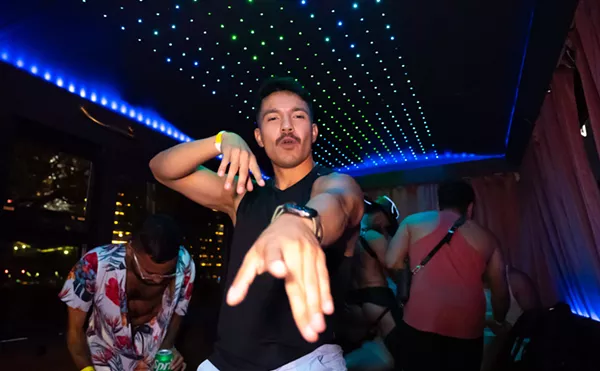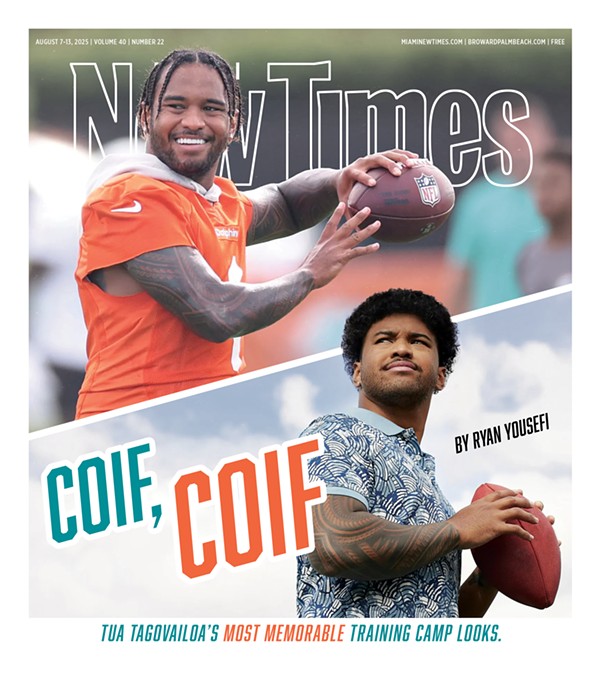Filmmaker Tony Montana had done his time in Los Angeles, first working as an actor where he played a pro wrestling manager for the WWE, then directing the acclaimed 2004 documentary Overnight where he chronicled Harvey Weinstein's blacklisting of a director. But he fell in love with South Florida and was looking for a reason to stay.
Then while walking to the Fort Lauderdale Library, Montana heard a man preaching and stayed to listen. "That's when I saw Gloria preparing to serve food to a large gathering of homeless people," Montana remembers. "She fed both breakfast and dinner to those in attendance during this four-hour bible study, which they conduct three times per month in addition to feeding breakfast every Sunday. I would return again and again."
Gloria was Gloria Lewis Vargas, a full-time waitress who for the past 15 years has spent her off days of Sunday and Monday cooking for and serving hundreds of meals for Fort Lauderdale's homeless. Getting to know Lewis Vargas gave Montana the reason he was looking for to stay in Fort Lauderdale. The result is the film Hard Truths, a six-minute documentary profiling Lewis Vargas and her passion to help those in need.
Lewis Vargas comes across as stunned that more people aren't doing what she's doing, living to help others. A half-hour conversation with her, as she took a break from her restaurant job, demonstrated this zeal was not an act put on for the camera.
"People are scared of people living in the streets," she tells New Times. "They're scared to ask how they're doing or to give two dollars. Taking the time to say a kind word or to give a dollar could be enough to save a life."
Lewis Vargas said she grew up dirt poor in Barbados before moving to the U.S. in 1987. Working hard she raised a family and lived a middle-class life, but she said that in 2004, she sensed trouble brewing. "I knew a housing bubble was coming. When the market crashed, everyone's credit was screwed up. Everyone who owned a house had to go back to renting, which drove rental prices up. At any time, I or anyone else could be homeless."
She wanted to help, but quickly grew frustrated by existing charities, government aid, and what religious organizations were not doing. "I don't get why churches don't step up. If every church housed five people, that would make all the difference." Most of her scorn is heaped on charities using entitlements. "You can't go from abnormal to normal in two months. They put addicts into recovery or into shelters, and their time schedule doesn't work. They go straight back to the streets. I've seen too many people go in and out, and they die."
Instead of feeling helpless, Lewis Vargas founded Care in Action USA, a charity that's mostly funded by herself and her husband, Antonio Vargas. "Any donations, the majority goes toward feeding people. Sometimes they need money for shoes. I always ask, 'Do you have a family? Can I buy you a bus ticket to get you to your family?'"
This attitude got Montana's camera rolling. Influencing his decision on how long he would make the project, he said, was "a short film that Spike Lee had directed about Don King and Mike Tyson back in the nineties. Don and Mike spoke boldly and minced no words in tirades about racism. Half of what they said was propaganda and the other half were truths."
They're hopeful the short, which was released online January 25, might open some doors to funding or volunteers. "It doesn't matter how many people see it, just that the right people see it," Montana said. "Gloria has tremendous goals laid out including the development of Care In Action USA Care Centers which, if enacted properly will serve as humanitarian alternatives to homeless shelters."
Whatever comes of the film, Lewis Vargas says she'll continue to feed the hungry every Sunday and Monday. "I tell my kids and grandkids you're secondary to the cause. I'm fighting for people no one is fighting for."

Audio By Carbonatix
[
{
"name": "GPT - Billboard - Slot Inline - Content - Labeled - No Desktop",
"component": "16971022",
"insertPoint": "2",
"requiredCountToDisplay": "2"
},{
"name": "STN Player - Float - Mobile Only ",
"component": "18617832",
"insertPoint": "2",
"requiredCountToDisplay": "2"
},{
"name": "Editor Picks",
"component": "15769925",
"insertPoint": "4",
"requiredCountToDisplay": "1"
},{
"name": "Inline Links",
"component": "16575154",
"insertPoint": "8th",
"startingPoint": 8,
"requiredCountToDisplay": "7",
"maxInsertions": 25
},{
"name": "GPT - Rectangle 2x - Slot Auto-select - Labeled",
"component": "15782206",
"insertPoint": "8th",
"startingPoint": 8,
"requiredCountToDisplay": "7",
"maxInsertions": 25
},{
"name": "Inline Links",
"component": "16575154",
"insertPoint": "8th",
"startingPoint": 12,
"requiredCountToDisplay": "11",
"maxInsertions": 25
},{
"name": "GPT - Leaderboard to Tower - Slot Auto-select - Labeled",
"component": "15782207",
"insertPoint": "8th",
"startingPoint": 12,
"requiredCountToDisplay": "11",
"maxInsertions": 25
}
]







